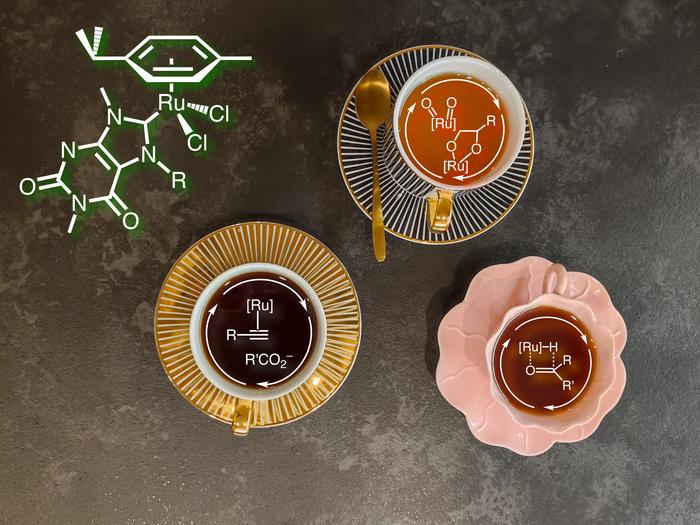A study by Lionel Delaude and François Mazars, researchers from the Laboratory of Catalysis at the University of Liège (Belgium), has shown that caffeine and theophylline can be used to ‘green’ catalysts based on ruthenium. This chemical element belongs to the transition metals. The results of this study have been published in the scientific journal Organometallics and will remain in open access for six months.

Credit: ©ULiège/L.Delaude
A study by Lionel Delaude and François Mazars, researchers from the Laboratory of Catalysis at the University of Liège (Belgium), has shown that caffeine and theophylline can be used to ‘green’ catalysts based on ruthenium. This chemical element belongs to the transition metals. The results of this study have been published in the scientific journal Organometallics and will remain in open access for six months.
Catalysts are ubiquitous in chemical processes because they enable reactions to be carried out faster and more selectively under milder experimental conditions. They are generally obtained from non-renewable raw materials, often derived from petrochemicals and metallurgy. In line with the twelve principles of “green chemistry”, chemists are now seeking to reduce the carbon footprint of their processes as much as possible. In this context, the team from the Laboratory of Organometallic Chemistry and Homogeneous Catalysis at the University of Liège has developed biobased catalysts derived from caffeine and theophylline, two natural substances from the xanthine family found in large quantities in coffee beans, tea leaves, and cocoa beans. The whole process of adding value to these compounds is environmentally friendly, since their extraction and separation from renewable plant sources requires only water and supercritical CO2 ,” explains Lionel Delaude, professor of chemistry and director of the laboratory. What’s more, they are under-exploited and available at low cost.
Slight modifications to the chemical structure of xanthines can be used to synthesize N-heterocyclic carbene precursors, which form the basis of many catalysts in the 21st century. The work of Lionel Delaude and his doctoral student François Mazars has shown that the combination of a para-cymene ligand derived from a-phellandrene (an essential oil found in many plants, including dill and eucalyptus) and an N-heterocyclic carbene ligand derived from caffeine or theophylline with ruthenium (a low-toxicity metal from the iron family) leads to the formation of highly effective catalysts for promoting three major types of organic reaction, namely, the transfer hydrogenation of unsaturated substrates with isopropanol, the oxidation of alkenes with sodium periodate, and the synthesis of vinyl esters from 1-hexyne and benzoic acid. This discovery contributes to developing more sustainable and environmentally friendly organometallic chemistry. Moreover, it opens the door to other catalytic applications using caffeine and theophylline to generate bio sourced N-heterocyclic carbenes.
This publication in Organometallics has been singled out by the editors of the American Chemical Society to be highlighted on the day of its publication (28 May 2023) and to remain in open access for six months as part of the ACS Editors’ Choice programme. It has also been selected to appear on the cover of an issue of the journal (July 10 2023).
https://pubs.acs.org/editorschoice/
Journal
Organometallics
DOI
10.1021/acs.organomet.3c00166
Article Title
Greening” Ruthenium-Arene Catalyst Precursors with N-Heterocyclic Carbene Ligands Derived from Caffeine and Theophylline
Article Publication Date
10-Jul-2023




